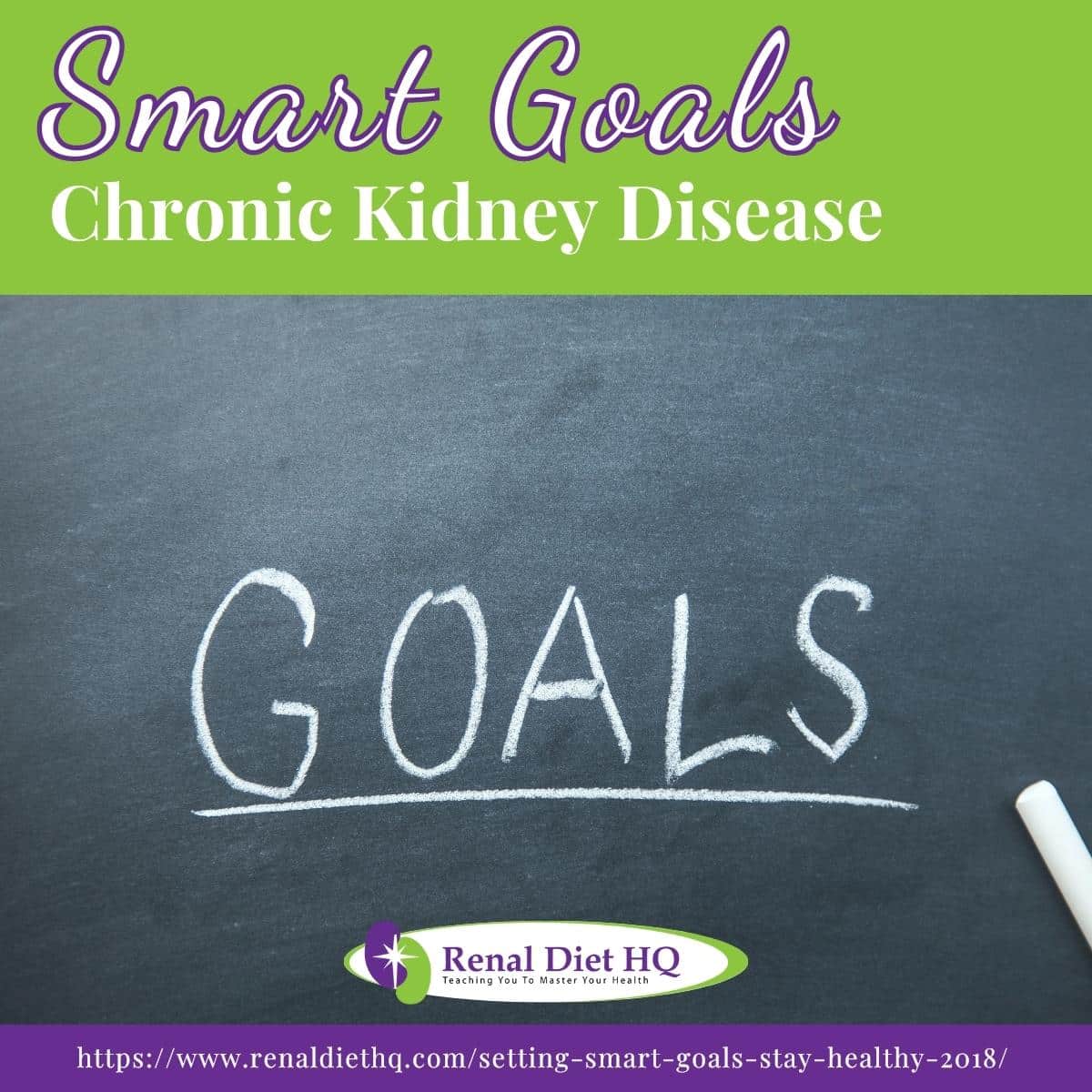Smart Goals for Chronic Kidney Disease
Living with chronic kidney disease (CKD) can be a challenge, but it doesn’t have to define your life. It is possible to set SMART goals that will help you take back control and improve your overall health.
SMART goals provide an actionable plan for achieving better outcomes for those struggling with this condition.
This article will show how setting these types of objectives is the key to managing kidney disease in a positive and proactive way.
The idea behind “SMART goal setting” is simple: create specific, measurable objectives that are both achievable and realistic while also pushing yourself outside of your comfort zone.
They should focus on areas where progress can be tracked over time, allowing you to measure success or failure more easily than if you simply made vague promises to yourself.
Applying this method when dealing with serious illnesses like CKD can give people hope by providing tangible results that lead to improved quality of life.

By learning how to properly set SMART goals for patients with kidney disease, individuals living with this condition can make significant strides towards regaining their independence and feeling empowered in their own healthcare decisions.
By setting SMART goals, you can be sure you achieve the changes you want to make and live a happier, healthier life, even with your CKD diagnosis!
Jump to:
What are SMART Goals
SMART is an acronym for an effective method of developing goals for your personal or professional life. People in business use SMART goals to reach their objectives in the same way you would use them to make changes for your health.
Let’s take a look at the five characteristics of a SMART goal:
- Specific – State exactly what you want to achieve. You can’t use vague statements like “exercise more.”
- Measureable – Your progress and results have to be quantified in some way. You will know how you are doing toward achieving your goal if you can measure the actions you have taken.
- Achievable – The goal must be one you can actually accomplish. SMART goals should be attainable goals and not dreams, such as winning the lottery.
- Relevant – Why is this goal so important to you? For CKD patients, you want to set goals that will have a positive impact on your health and daily life.
- Time-bound – Give yourself a deadline to meet your goal. If you set large goals, you can still break them down into smaller goals, with due dates for each to be achieved.
With these ideas in mind, let’s take a look at what SMART goals would look like for a CKD patient:
- Eating Healthy Specific – I will cook dinner at home at least 5 nights a week.
- Measurable – I will keep a food log of all the meals I eat.
- Achievable – I will cook my own meals for 5 nights.
- Relevant – Cooking my own meals means I can follow my renal diet given to me by my doctor.
- Time-bound – I will be cooking 5 nights per week by next month.
You may even want to look into a cookbook for CKD patients!
For More Recipes and Ideas --->> Get Your Free Meals and Recipes That Are Perfect for Pre-Dialysis Diets, Pre-Dialysis with Diabetes, or Dialysis Diets.
Benefits Of Setting SMART Goals
Setting SMART goals for CKD can be a powerful tool for managing the condition. By establishing achievable and measurable objectives, individuals with CKD can track progress over time and make changes as needed to better manage their health.
Creating specific goals is essential to setting up an action plan that will help you reach your desired outcome. Identifying what you want to achieve in concrete terms gives you something tangible to work towards.
It's also important to think about how you'll measure success; this could involve tracking milestones or setting deadlines along the way.
Attaining realistic goals requires careful consideration of resources such as time, money and energy.
In addition, making sure that your goals are measurable and relevant to the challenges posed by CKD, such as following a low sodium kidney diet, potassium intake, etc, helps you track your progress and results to know how you are doing toward achieving your goal.
It's equally important to set reasonable timelines when working towards any goal - especially those related to serious medical conditions like CKD where progress is often slow and steady rather than rapid change from one day to the next.
Establishing short term checkpoints throughout longer projects helps keep motivation high while ensuring adequate time for rest and recovery between major milestones can prevent burnout before reaching long-term achievements.
Crafting Specific Goals For CKD Patients
Believing that CKD is an incurable condition can be disheartening. However, this needn't be the case! Crafting specific goals for those with CKD can help them take control of their lives and live better, healthier lives in spite of the illness.
The first step to creating CKD-specific goals is understanding what kind of lifestyle changes are necessary. This could include reducing sodium daily intake, increasing fiber intake, body weight goals, increasing physical activity level, or eating a diet consisting of mostly fruits and vegetables.
Additionally, it's important to understand one's own limitations when setting these goals so they are achievable in the long term.
Setting realistic expectations will encourage positive outcomes over time rather than immediate results that may not last.
It's also wise to involve healthcare professionals in goal-setting by asking questions about any potential risk factors associated with certain activities or treatments related to CKD and getting advice on how best to manage them.
Moreover, having support from family members and friends can make it easier for individuals with CKD to stay motivated and reach their long-term goals.
With proper following of dietary guidelines and knowledge of available resources, patients with CKD can develop meaningful objectives that lead to greater health and quality of life.

Measuring Progress Towards Goals
Creating specific goals for patients with CKD is only the first step in improving their health. To ensure that those goals are reached, it is important to measure progress towards them and track any changes in a patient's condition.
This helps to identify whether or not treatments are working and allow for adjustments if needed.
There are many different methods that can be used when measuring progress towards CKD goals.
Monitoring lifestyle changes like diet or exercise, taking medication regularly (ckd and diabetes medications), attending counseling sessions, and tracking vital signs such as blood pressure or body weight gain/loss are all common tools used by medical professionals to gauge a patient’s success over time.
It’s also important to evaluate mental health through self-assessment tests and reflect on any changes in mood or motivation so that your doctor has an accurate understanding of the current situation.
The best way to ensure successful measurement of progress towards CKD goals is to create a plan that includes regular check-ins with your healthcare provider and use multiple methods of assessment when possible.
Setting reminders for yourself throughout the day, using journals or diaries to document thoughts and feelings, joining support groups online if available.
These are just some of the ways people can stay accountable during their treatment process and keep track of their journey towards improved health outcomes.
To encourage goal achievement, it is important to keep CKD patients engaged in their care plan while providing positive reinforcement whenever possible. Sharing successes, even small ones, will help motivate patients to continue making progress toward larger milestones
Being proactive about monitoring our own well being is invaluable in managing chronic disease like CKD; taking control allows us to recognize small successes along the way which further encourages positive behavior change over time.
To encourage goal achievement, it is important to keep people with kidney failure engaged in their care plan while providing positive reinforcement whenever possible.
Sharing successes, even small ones, will help motivate patients to make longer-term behavior change—ultimately leading to improved quality of life associated with managing CKD.
Adjusting Goals As Needed
It can be a slippery slope to stay on top of managing CKD. Setting CKD friendly New Year's resolutions is like steering a boat in heavy winds – it takes time, patience, and practice.
Here are three items that should be included when setting or adjusting your goals: *
- Have realistic expectations. You’ll have good days and bad days but try not to get discouraged by setbacks.
- Consider changes in lifestyle. This could mean making adjustments such as reduction in salt intake or exercising more regularly. You can make heart healthy lifestyle changes for CKD.
- Monitor your health closely with doctor visits, tests, and other treatments so you can adjust accordingly if needed.
Managing CKD requires dedication and perseverance every day; however, the end result will be worth it as you become healthier and stronger than ever before!
By taking charge of your own health through goal-setting and adjustment, you'll find a renewed sense of strength and self-empowerment while helping others feel the same way too.
Coping With Setbacks
When dealing with CKD, we all experience setbacks. It's important to remember that managing the symptoms of this condition can be challenging and it may take time to adjust our lifestyle accordingly.
Coping with failure is an essential part of living a healthy life despite the limitations imposed by CKD.
One way to deal with any frustrations or difficulties you face in staying on track with your goals is to focus on small wins each day.
Make sure you celebrate even the smallest successes and remind yourself why they're so meaningful. Keeping a positive attitude will help you stay motivated as you work toward bigger achievements down the line.
It’s also helpful to acknowledge any feelings of overwhelm rather than suppressing them. Try setting aside some time for self-care activities such as yoga or meditation. Yoga and CKD are a good pair!
Anything that helps reduce stress levels and puts your mind at ease. Knowing when to take breaks is just as important as pushing yourself outside your comfort zone, so don't forget to make relaxation a priority too!
Living with CKD requires dedication, but ultimately it’s worth it if it means achieving better health outcomes in the long run. Remember: progress takes patience, resilience, and plenty of support from loved ones along the way - never underestimate the power of having someone who believes in you!

Creating An Action Plan
Creating an action plan for managing CKD is essential to achieving SMART goals. An effective action plan consists of steps and strategies that target a specific goal, such as improving overall health or reducing symptoms associated with the condition.
Here are some tips on how to create an action plan:
The first step in creating an action plan is to identify the goals you want to achieve. This means recognizing what changes need to be made in order for your desired outcome to become reality.
Once these goals have been identified, it’s time to start thinking about the best way to reach them. Consider lifestyle modifications, such as a healthy weight, dietary behavior, and exercise, that can help improve your condition over time.
Additionally, discuss potential treatments with your doctor so that they can recommend which ones might work best for you, as each plan should be adjusted based your stage of renal failure. Early stage kidney disease is different than the final stage!
For example, people with stage 1-2 renal failure might be allowed 1,500-2,000mgs of sodium daily, while people with stage 3-4 or patients with renal failure with dialysis might require stricter sodium restrictions as low as 1,000mgs of sodium each day.
After identifying objectives and possible solutions, the next step is to make those solutions into achievable tasks by setting realistic deadlines and timelines.
Establishing clear deadlines will give you something concrete to strive towards while also allowing you to track progress along the way.
Additionally, breaking up large tasks into smaller parts or components may help make them more manageable and easier to complete within a reasonable time frame.
Finally, once everything has been planned out and organized accordingly, don't forget to reward yourself when each task is completed! Celebrating successes helps keep motivation levels high throughout the entire process.
In short, creating an action plan involves taking stock of one's current situation and outlining both short-term and long-term goals in order to develop personalized strategies for reaching those goals effectively.
Taking the necessary steps now can result in improved quality of life down the road - so get started today!
Frequently Asked Questions
When faced with a challenge, setting goals is the first step to success. As the saying goes: "A goal without a plan is just a wish".
When it comes to managing CKD, having an actionable plan can be key in supporting patients and their families on their health journey.
This article will discuss how one might get help in setting SMART goals for CKD, as well as tips for tracking progress towards those goals.
The most important thing when it comes to setting goals is finding the right support system. Having someone who understands your individual needs can make all the difference.
Finding a therapist or doctor that specializes in working with CKD patients is essential, as they are invaluable resources when it comes to understanding both the physical and emotional aspects of living with this condition. You can always look into seeing a nephrologist! What is the difference between a kidney doctor and a nephrologist?
Additionally, there are many online communities dedicated to helping individuals set realistic yet achievable goals by providing support and guidance from others going through similar experiences.
In order to create meaningful objectives, one must understand what exactly constitutes a ‘SMART’ goal –
Specificity, Measurability, Attainability/Achievability, Realism/Relevance and Time-boundness - which should form the basis of any patient's treatment plan.
Tracking progress towards these objectives offers valuable insight into patients' overall wellbeing; whether it's keeping an eye on systemic blood pressure levels or maintaining dietary restrictions prescribed by doctors, tracking successes can provide much needed motivation during times of difficulty or frustration.
For those needing additional assistance in creating SMART goals tailored specifically for CKD management, certain apps have been designed to offer personalized solutions based on individual circumstances while also allowing users to track progress over time using graphical representations such as charts and graphs.
Managing CKD requires dedication and patience but having access to the necessary tools makes this process easier for both patients and their caretakers alike.
While no two cases may be identical, having clear objectives along with suitable methods for achieving them sets people up for greater success down the road - thus providing hope that life after diagnosis can still be filled with possibility!
Adjusting goals for CKD can be a daunting task. But understanding when and how to modify your objectives is an essential part of managing this condition.
When it comes to fine-tuning CKD goals, frequency is key: You should adjust them as often as necessary in order to stay healthy and achieve success.
However, there are no hard-and-fast rules here; the ideal timing depends on your individual situation.
Generally speaking, if changes occur in your lifestyle or symptoms that affect your ability to reach those goals - such as a move, new job, or different treatments - then it's time to consider revising your objectives. Know the signs and symptoms of kidney failure.
It’s also important to reassess after any significant milestone has been achieved – such as completing a fitness program or reaching certain blood pressure levels – so that you don’t fall into complacency and remain motivated towards long-term progress.
No matter what adjustments need to be made along the way, always remember that you have control over changing CKD goals and modifying them for personal effectiveness.
Staying mindful of this power will help ensure you stay focused on achieving optimal health outcomes now and in the future.
Coping with CKD setbacks can be difficult, but there are resources available to help. Whether you're looking for coping strategies or support services, it's important to know that assistance is out there.
In this article, we'll discuss some of the options available and how they can help those struggling with CKD.
When facing a setback due to CKD, it's essential to have access to reliable sources of information and guidance. Support groups provide an invaluable resource in this regard as they bring together people who understand what you’re going through and offer encouragement and advice.
Additionally, online communities also allow individuals to share their experiences and find companionship during tough times.
It may also be beneficial to seek professional counseling if CKD-related issues become overwhelming. Licensed therapists specialize in helping people cope with illness-related stressors and developing effective coping skills for long-term success.
Furthermore, certain medical professionals such as nephrologists or social workers may also provide additional support depending on your individual needs.
No matter where you turn for assistance, it is vital that you reach out when faced with CKD setbacks so that you don't feel helpless or isolated.
With the right resources at your disposal, you will be better equipped to manage any difficulties arising from your condition and take steps towards achieving positive outcomes in the long run.
Nearly 37 million Americans are affected by CKD. With such a large number of people living with the condition, it is important to focus on how one can build a supportive network for CKD management.
This includes understanding what coping strategies and resources are available to help individuals living with this chronic disease overcome any setbacks they may encounter.
Having a reliable support system in place can go a long way towards helping those with CKD manage their symptoms more effectively. A great starting point is identifying key people who can provide emotional and practical assistance when needed.
These could be family members, close friends, healthcare professionals or even specific organizations dedicated to providing support and advice to those struggling with CKD.
Additionally, having access to online communities where individuals share their experiences and offer mutual support can also be beneficial.
Finding ways to cope with difficult emotions associated with managing CKD should also be part of building an effective supportive network.
Taking time out for self-care activities such as mindfulness meditation, yoga or creative pursuits like journaling are just some examples of tools that have been found helpful for stress reduction and better overall mental wellbeing.
Furthermore, seeking professional counseling from experienced therapists trained in dealing with issues related to chronic disease is another option worth considering if further guidance is required.
By taking these steps into account and establishing positive relationships among those involved in the caregiving process, individuals living with the condition will find themselves equipped with much stronger coping mechanisms which should prove invaluable during times of difficulty or distress.
It has been shown that having social connections helps reduce feelings of isolation while fostering resilience; thus enabling someone affected by CKD to live life much more meaningfully despite its challenges.
Manage Chronic Kidney Disease With SMART Goals
It is important to remember that when setting SMART goals for CKD, it is not only about what you want to achieve but how you are going to get there.
With the right support network and effective management techniques, individuals can make great strides in their CKD goals.
For example, Johnny was recently diagnosed with CKD and had been struggling with his health since then.
He set up a team of healthcare professionals who could help him manage his condition, created an action plan outlining steps he would take towards reaching his goal of improved kidney function, and developed a supportive circle of family and friends so that he always felt supported along the way. It is possible to spend time improving kidney function with diet.
By following these tips and staying committed to managing CKD, Johnny was able to reach his goal and improve his quality of life as well as overall health.
Overall, setting SMART goals for CKD requires dedication and determination from those living with this condition. It is essential to have realistic expectations while also maintaining hope for better outcomes in the future.
When done correctly, establishing short-term achievable objectives can be incredibly helpful in improving one’s physical wellbeing as well as emotional stability related to dealing with CKD on a daily basis.













